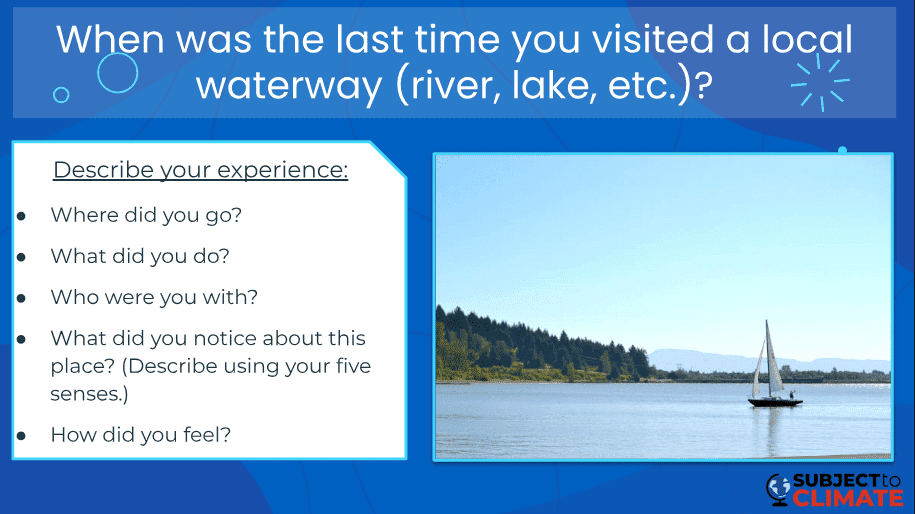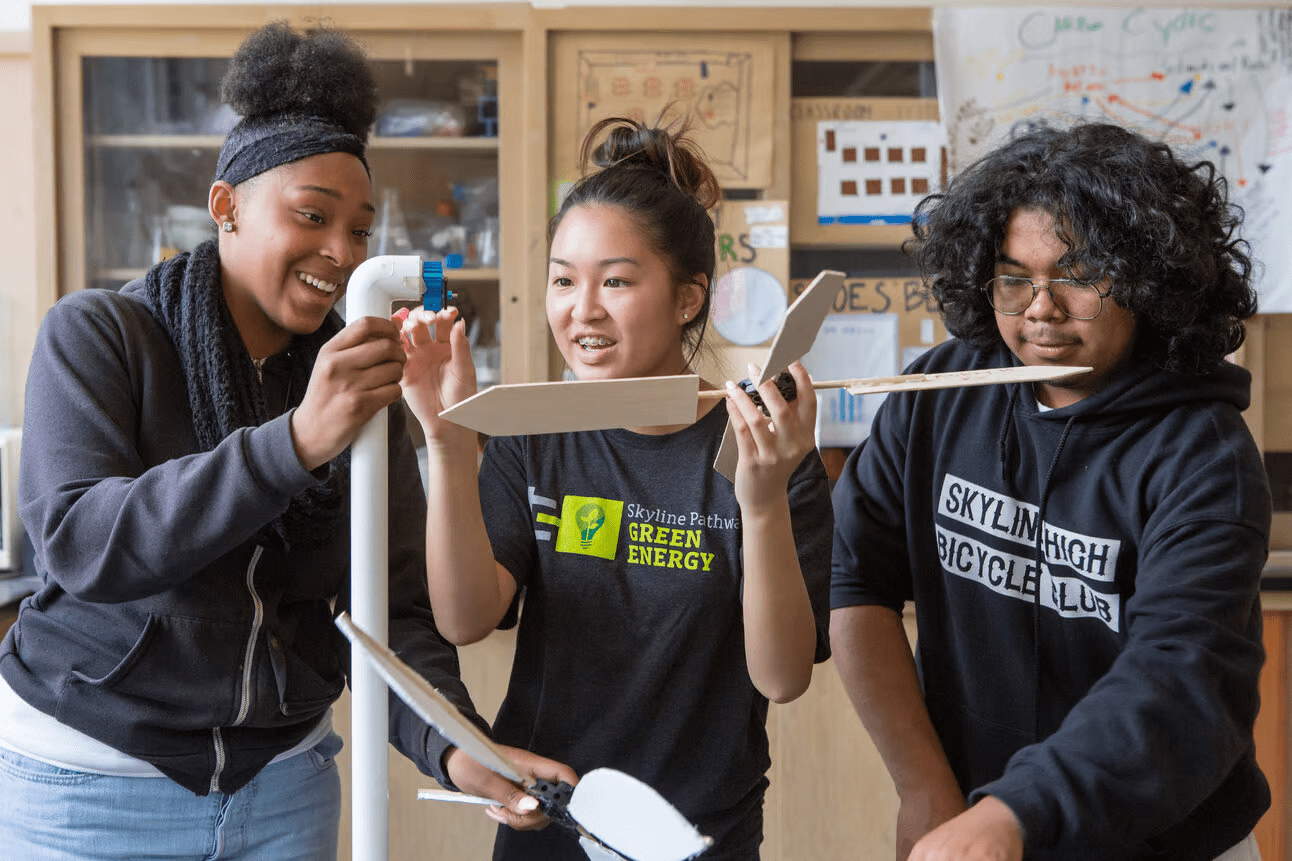Imagine a day at school — say you’re in seventh grade — where every class focuses on climate change.
In English, you learn about the difference between facts and opinions and practice these media literacy skills on statements about climate science and policy. Or you might analyze a poem about climate change — like Amanda Gorman’s Earthrise — and take inspiration to write your own. In math class, you calculate peak sun hours for solar panels as part of an ongoing renewable energy algebra unit.
Social studies is a human geography lesson about how wildfires affect marginalized communities. You even play games themed around recycling and waste during Phys. Ed. And there’s no shortage of climate content for science class — from understanding changing winters and melting ice caps, to connecting food waste and the chemistry of landfills to the warming earth.
These units and many more like them are ready for Maine teachers to use in their own classrooms as part of the new Maine Climate Hub, launched this week by the national nonprofit Subject to Climate and the Maine Environmental Education Association (MEEA).
It’s a Maine-tailored database of scientist-vetted lesson plans and resources about climate change and the environment, for all subjects and grade levels. Teachers are not required to use it, but advocates say it’s something many want and that the state has prioritized in its climate and educational goals.
“It’s about integration, instead of adding additional work on a teacher’s plate,” said Subject to Climate co-founder Margaret Wang in an interview for Climate Monitor this week. “Teachers are never taught about climate change — that’s why they need the extra support.”
Wang co-created Subject to Climate in 2021 through a Harvard University climate entrepreneurship incubator. Maine follows New Jersey as the second state with its own customized online hub.
Unlike New Jersey, which in 2020 became the first state to require climate education across all grades and in most subjects, Maine requires only basic climate instruction as part of the Next Generation Science Standards. Interdisciplinary approaches are more voluntary. Still, many Maine teachers have expressed a need for this kind of resource in recent years.
The Maine Mathematics and Science Alliance’s 2019 Census of Community-Based Environmental Learning reported that among hundreds of educators, “far and away the most requested topic was instruction around climate change/sustainability/energy issues.” And the state’s 2020 climate plan includes a goal of adding more climate education and career preparation in Maine public schools.
That led to MEEA’s 2021 Climate Education Summit, attended by more than 200 teachers, students and scientists, said MEEA executive director Olivia Griset in an email.
“One of the key requests was an online hub where they could find free, vetted resources that are aligned to Maine standards, news articles for students, support from scientists, and a one-stop-shop to find out about Maine-based professional learning opportunities to advance teacher training,” she said.
Last year, the state passed a bill supported by groups like MEEA and MMSA that created a pilot grant program for teacher professional development related to climate education. And in December, the state Department of Education and MEEA updated the state’s Environmental Literacy Plan, which highlights climate education and includes a goal of creating a statewide resource hub.
Griset, who is a member of the working committee for the new Maine Climate Hub, said this new service supports this goal and responds to teachers’ needs directly, calling it “a critical tool we will use to advance climate education in Maine in the next five years.”

The lesson plans on the hub each align with specific standards required in Maine schools. Users can search by standard, grade level, subject and more. The site also includes professional development modules and a “help” feature where teachers can ask and answer questions for each other about, for example, whether to talk about their own climate anxiety with their students.
“Our idea is to make it the easiest that we possibly can for them to add climate change into anything and everything that they might already be teaching,” said Julia Turner, a senior research associate at Subject to Climate.
The group and its local partners will convene a training session this fall where teachers can learn to create their own Maine-centric lesson plans to add to the database. New Jersey teachers have filled their state’s hub with lots of original materials about key climate impacts in their state, such as sea level rise.
Wang, a former teacher, said it’s common in the U.S.’s “very decentralized education system” for educators to seek curriculum resources online. But it can be hard for them to vet what they find. Misinformation is all but unavoidable on topics like the impacts of fossil fuels vs. renewable energy.
The Florida Department of Education told local NPR station WUSF last month that they’ve approved the use of classroom videos made by the conservative nonprofit PragerU, including some that question established climate science.
“There has been a history of a lot of corporations being involved in climate education,” Wang said. “That means that it’s extra important to find resources that are credible.”
On the Maine Climate Hub, each lesson plan comes with notes and a seal of approval from scientists.
“Most teachers — most people aren’t climate change experts,” said Turner. “We’re trying to take the guesswork out of that so that teachers can actually just teach, instead of spending all this time on prep.”
In evaluations so far, she said, educators using the New Jersey hub appear to be teaching climate change more often, with more confidence, as well as engaging in more professional development on the subject.
The benefits go far beyond just incorporating current events into the classroom. Advocates say teaching young people to understand and respond to climate change empowers them to act and lead in their communities.
One of the few scientific studies on this found that college students who took a course about climate change changed their behavior and lifestyles as a result, leading to a reduction in carbon emissions.
“Especially in public schools, you’re reaching a really large number of people and are reaching all kinds of people in the population,” said Turner. “We talk about, sometimes, the virtuous cycle of climate action. … Climate change education can really be an effective way to start that off and get that ripple effect going.”
As Ogechi Obi, now a Bangor High School alumna, told me when I was reporting on Maine’s climate education legislation for Spectrum News last year: “You can’t really fight what you don’t understand.”







